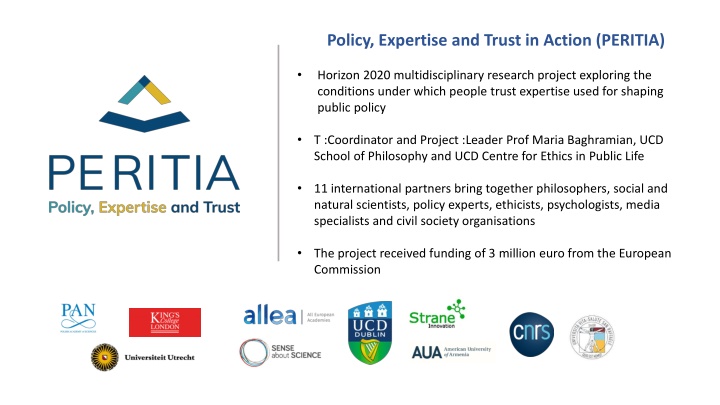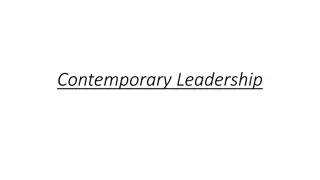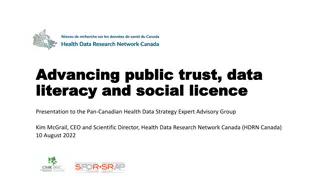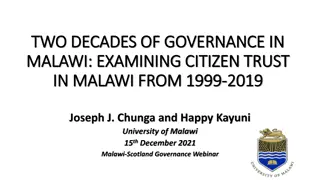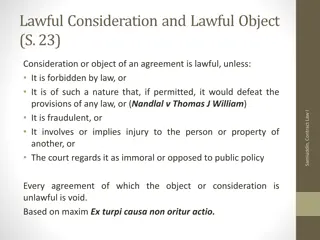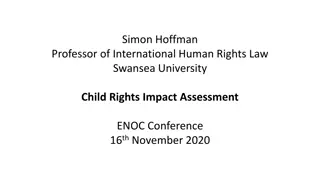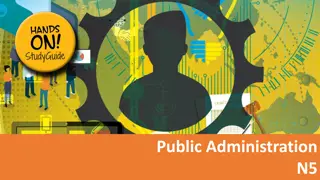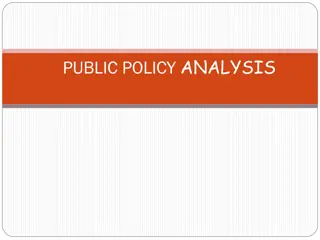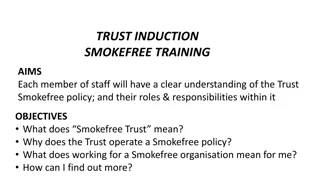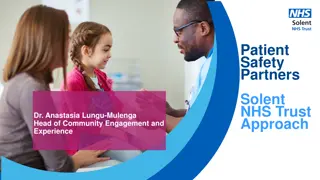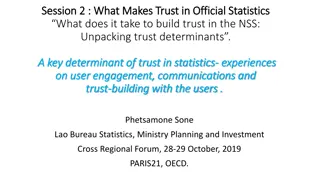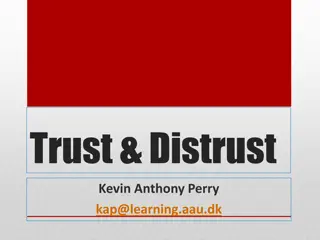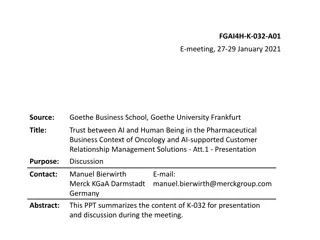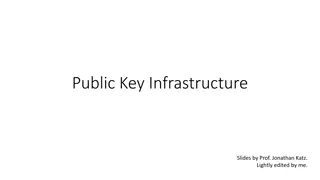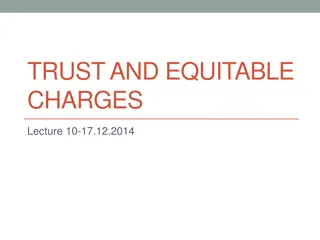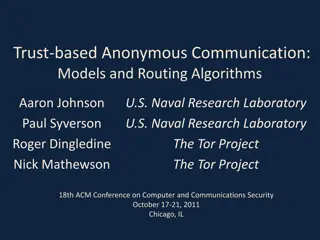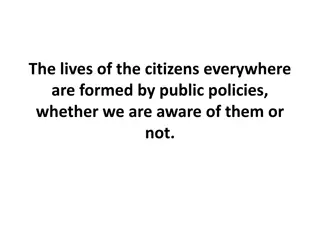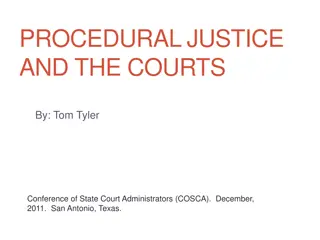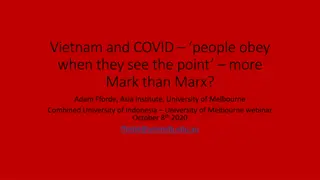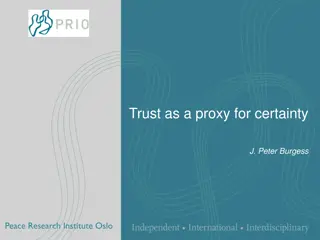PERITIA: Exploring Trust in Policy Expertise for Public Impact
PERITIA is a Horizon 2020 project led by Prof. Maria Baghramian, focusing on understanding how trust in expertise shapes public policy. The project involves international partners and aims to provide practical recommendations for building trust, combating disinformation, and promoting critical thinking. Through initiatives like Citizens Fora and a Trustworthiness Toolkit, PERITIA addresses the challenge of distinguishing trustworthy information from fake news in a post-truth era.
Download Presentation

Please find below an Image/Link to download the presentation.
The content on the website is provided AS IS for your information and personal use only. It may not be sold, licensed, or shared on other websites without obtaining consent from the author.If you encounter any issues during the download, it is possible that the publisher has removed the file from their server.
You are allowed to download the files provided on this website for personal or commercial use, subject to the condition that they are used lawfully. All files are the property of their respective owners.
The content on the website is provided AS IS for your information and personal use only. It may not be sold, licensed, or shared on other websites without obtaining consent from the author.
E N D
Presentation Transcript
Policy, Expertise and Trust in Action (PERITIA) Horizon 2020 multidisciplinary research project exploring the conditions under which people trust expertise used for shaping public policy T :Coordinator and Project :Leader Prof Maria Baghramian, UCD School of Philosophy and UCD Centre for Ethics in Public Life 11 international partners bring together philosophers, social and natural scientists, policy experts, ethicists, psychologists, media specialists and civil society organisations The project received funding of 3 million euro from the European Commission
Currently in Phase 3 Currently in Phase 3 Webpage: https://peritia-trust.eu Phase 3: Practical recommendations and outreach Citizens Fora. Aim: A better understanding of role of trust in experts: London, Dublin, Berlin, Warsaw, Yerevan (completed) Essay Competition Youth on Trust (https://peritia-trust.eu/youth- on-trust-essay-collection/) Behavioural Tools for Building Trust : Trustworthiness Toolkit Policy Recommendations and Dialogue with Policy Makers (Brussells May 4 and 5, 2023. do please come).
Connections with the Problem of Disinformation Trust is experts i epistemic trust (contrasted with interpersonal trust) Key Element: Trust in testimony: Trust in what others tell you and you are not in a position to verify directly. Testimonial trust and our trust or distrust of experts are directly connected with the spread of fake information. Objective: to accept trustworthy testimonies and sources and to distrust the untrustworthy. Fake news is untrustworthy, but how do you decide what is fake? How do you avoid the post-truth syndrome, where belief is influenced by affective impact and personal connections than by evidence?
PERITIA Trustworthiness Toolkit Ensuring reliance on trustworthy media, and avoiding untrustworthy media, is one of the goals of PERITIA. But often family and friends are the trusted source of disinformation and misinformation. So. a broader approach than media literacy is needed. Two possible approaches for addressing the crisis of misinformation and unwarranted trust and distrust. 1. Interventionist. vs 2. Preventative approaches (1) is needed at times of crisis, e.g. Covid, when there is need for immediate intervention (TV advertisement, Government targeted announcements, etc. Evidence that longer term, preventative methods are more effective in combating the spread of unwarranted trust and mistrust (e.g. , use of critical thinking training to immunize against conspiracy theories). The PERITIA Trustworthiness toolkit is a step towards (2) but can also be used as an interventionist method.
Background to the Toolkit The project poses and answers seven questions. Four of these provide the material for the toolkit Q.3 What is the role and impact of digital media and new communication technologies on judgements of the trustworthiness of experts Q4. What are the key indicators of the trustworthiness of the experts? (WP5, WPs 8, 9, 10) Q5. What are the psychological (affective, cognitive) mechanisms involved in trust in experts? (WP6, WP8 and WP10) Q6. What are the essential ethical considerations relevant to trust in experts? (WP7, WP 9 and 10)
Theoretical Justification. Dimensions and Markers The multivalence of Trust and Trustworthiness. Dimensions of trustworthiness: we proposes six dimensions Each dimension has a numbers of markers of trustworthiness. D1.The Expertise Dimension (Is the source an expert?) Marker 1: Training Marker 2: Experience Marker 3: Credentials Marker 4: Knowledge of relevant policy issues and how they relatd to the the scientific field Negative marker: Epistemic trespassing. A recognized expert in one area who gives recommendations on issues unrelated to their field.
The Ethical Dimension (does the expert act with integrity and absence of malice) Marker 1: Conflict of interest and transparency about it Marker 2: Track record of integrity Marker 3: Awareness of social consequences Marker 4: Transparency about moral and religious and political values Marker 5: Benevolence or willingness to act in the interest of the recipients of their advice. Marker 6: Taking responsibility for their testimony Negative Marker: Dishonesty: Plagiarism, faking experiments, cherry- picking data and statistics, and systematic misrepresentation of others work are symptoms of a person s dishonesty.
3. The Reputational Dimension. Reputation is fully socially constructed, so different from the first two dimensions. Marker 1: Authority Marker 2: Status Marker 3: Influence Negative marker: The type of social footprint they leave. For instance, who does or does not follow them on twitter or engage with them positively or negatively.
4. Credible content (is the message credible?) Marker 1. Coherence (Avoiding contradictions, appropriate logical connections.) Marker 2. Scientific consensus in the field Negative marker: Inflammatory rhetoric, glossing over inconsistencies.
. Trustworthy sources Marker 1 Diversity of backgrounds and opinions Marker 2 Tone of the content Marker 3 Clear distinction between facts and opinion (reporting vs. editorialising) Marker 4 Willingness to acknowledge their mistakes. Negative Marker: Click bait, unattributed sources., echo chambers.
6. Self-reflection on Trustworthiness Marker 1: Personal and political biases and attempts at overcoming them. Marker 2: Truth vs material and emotional interests. Marker 3: Epistemic vulnerabilities. (Am I in a good position to reason about this particular area of expertise?) Negative marker: Cognitive biases such as confirmation bias, desirability bias, and motivated reasoning, Dunning-Krugereffect
The toolkit: public interface The six dimensions of trustworthiness are translated into questions in an accessible language. Question 1. How are you going to decide who is an expert in a particular field? Question 2.Does the expert behave ethically? Question 3. How do you judge the reputation of an expert? Question 4: Is the expert a credible source of information? Question 5. Are you using reliable sources of information in your decision about who trust? Question 6. How do you become a better judge of trustworthiness?
Step 2. Test yourself One of more news item or example relevant to each Question Is x trustworthy? Test yourself (pass or fail) Watch a video of 20 seconds Go to further questions and tips about trustworthiness relevant to the that question (dimension) based on the markers enumerated earlier. Click on resources relevant to the above.
Test 1: Is Thomas Eriskson a trustworthy expert? Thomas Erikson 4 color theory
Click on yes or no and see if you were right Well done (too bad) , you have chosen the right (wrong) answer Explanation: Thomas Erikson was discovered a fraud and his book one of the biggest pseudoscience scandals in recent history. Not only was the science behind his book unreliable, but investigations in his background revealed his complete lack of experience in the field.
Followed by a 20 second video When you have to assess whether a piece of information is true or false, [Scene 1 - A person is shown in the middle of the screen, with a computer, and two boxes over them: True and False buttons. A cursor is moving behind them, from one button to another.] you can think like a lawyer or like a detective. [Scene 2- two screens are introduced from the left and right side. One contains the person dressed as a lawyer, the other as a detective.]
New page: Further questions and tips Here are some points that you should consider when you want to decide who is a genuine expert in a particular field. An expert should have good training in their field of expertise. This should be visible in their CV or other publicly available information. Does the expert have proof of their qualifications, like education and professional achievements? Be careful about experts with high reputation in one area making recommendations on issues clearly unconnected to their field. Recognition from peers is a key aspect when determining expertise, for instance references to them or their impact made by others working in the same field. Is there evidence that they engage with other experts? Experts who give advice on policy issues should show awareness and sensitivity about the policy implications of their advice. Is the expert willing to engage with the public on these issues? Some of the technical terms are defined in a glossary and pop out in the interface.
further hyperlinks and texts relevant to the above Simple guidelines https://statmodeling.stat.columbia.edu/2020/08/04/which-experts- should-we-trust/ Articles in suitable for the general public https://theconversation.com/why-we-trust-experts-even-when-they- admit-they-dont-know-the-answer-172562 Videos and podcasts https://www.youtube.com/watch?v=kz3rImFSrbA Manuals Academic articles https://www.tandfonline.com/doi/epdf/10.1080/02691728.2022.2106459 ?needAccess=true&role=button
Participants click on yes or no button Yes/No answer Explanation Wakefield had a conflict of interest in the litigation and testing businesses that was not revealed until long after his study was published, and then retracted, by the medical journal The Lancet. Vidoe Next page Here are some questions and tips that you should consider when you want to decide if an expert is ethically trustworthy. Experts who give advice on policy issues should show awareness and sensitivity about its implications. Do they consider what is in the public interest when giving expert advice? Do they show sensitivity towards those who are in a position of social and economic disadvantage? Personal political, social and religious views can influence an expert s advice or opinion, are they open about their possible conflicts of interests? Look out for signs of dishonesty: plagiarism, faking experiments, cherry-picking data and statistics, and systematic misrepresentation of others work are symptoms of a person s dishonesty. Is there past evidence of fraud?
Future plans The prototype toolkit, with c. 10 entries, will be tested We would like to develop it fully across the various markers and add new dimensions, if necessary, and update the entries regularly To link the toolkit to a critical thinking course based on what is being delivered by a colleague in UCD and is one of the most successful undergraduate modules in the university.
Acknowledgement This work has received funding from the European Union s Horizon 2020 research and innovation programme under grant agreement No 870883.
